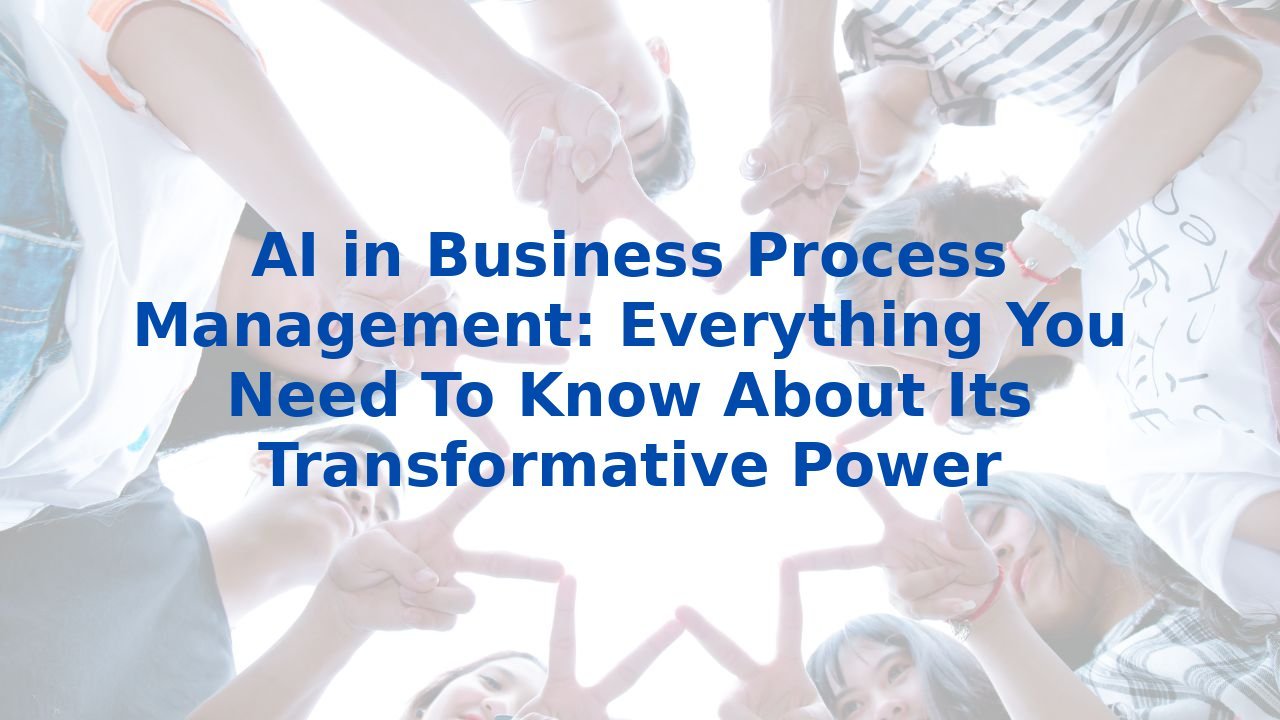AI in Business Process Management: Everything You Need To Know About Its Transformative Power
AI in Business Process Management: Everything You Need To Know About Its Transformative Power
In the relentless pursuit of efficiency, organizations are constantly seeking innovative solutions to enhance their operations. Enter Artificial Intelligence (AI), which is not just a buzzword but a transformative force in the realm of Business Process Management (BPM). Today, we explore how AI is revolutionizing business processes, unlocking immense value while demanding a thoughtful approach to employee training and adaptation.
Understanding AI in Business Process Management
At its core, AI in BPM refers to the application of advanced algorithms and machine learning techniques to optimize and automate workflows. From automating mundane tasks to performing complex data analysis, AI streamlines operations and offers a competitive edge. Consider AI’s role in building process maps; it diminishes the time spent on manual input by analyzing existing workflows and suggesting improvements based on user-defined criteria.
The Role of AI in BPM
AI's contribution to BPM can be encapsulated into three powerful components: data analysis, process construction, and automation. First, let’s talk about data analysis. AI brings a game-changing ability to uncover hidden insights by identifying trends and predicting outcomes. This real-time analysis allows organizations to make informed decisions swiftly.
Secondly, the capacity to construct processes based on sophisticated pattern recognition not only simplifies workflow creation but enables businesses to adapt to change more rapidly. Finally, automation is where the magic happens—liberating team members from repetitive tasks, which ultimately allows them to focus on strategic thinking and creative problem-solving.
AI's Impact on Human Resource Processes
One significant area where AI shines is in Human Resources. With the help of AI, HR professionals can now sift through mountains of data for tasks such as recruitment and candidate selection. The potential of AI to foster an objective salary structure, based on performance data and market trends, elevates fairness and competitiveness in hiring. Additionally, AI can personalize employee onboarding experiences and create tailored career pathways, enhancing overall employee satisfaction.
Transforming Sales Processes with AI
The sales landscape is another domain ripe for AI integration. Automation tools can handle routine processes like lead scoring, allowing sales teams to concentrate on what they do best: engaging with customers and closing deals. AI refines sales strategies by suggesting optimal channels, upsell opportunities, and drafting content that resonates with potential clients through chatbots.
Wider Applications: AI Across Business Processes
Beyond HR and sales, the reach of AI extends to various business processes including production, marketing, customer support, and contract management. Every aspect of an organization stands to gain from AI's capability to enhance efficiency and eradicate redundancies. From fulfilling product requests to managing vendor approvals, AI’s influence is broad and deeply integrated into the business fabric.
Continuous Improvement through AI Process Discovery
AI process discovery harnesses technologies like process mining and natural language processing to highlight inefficiencies within workflows. These insights validate data flows, spotlight bottlenecks, and pave the way for continuous improvement. An iterative approach, driven by AI feedback loops, allows organizations to enhance processes measurably and sustainably.
The Multifaceted Benefits of AI in BPM
When implemented effectively, the advantages of AI in BPM are profound:
- Enhanced Productivity: By automating repetitive tasks, teams can allocate their time to more critical activities.
- Improved Decision-Making: AI uncovers actionable insights, empowering executives to make informed choices.
- Cost Reduction: AI minimizes operational errors and reduces manual intervention, streamlining costs significantly.
- Superior Customer Experience: Through the analysis of feedback and personalized communication, AI improves customer interactions.
- Real-Time Monitoring: AI facilitates the instant identification of issues, allowing businesses to respond promptly.
Empowering Employees for an AI-Driven Future
Adopting AI isn’t merely about integrating the technology; it’s equally critical to prepare your workforce. Proper training ensures that employees understand AI capabilities and how to leverage them effectively. This journey includes:
- Understanding Capabilities: Employees should be familiar with AI's potential and its impact on productivity.
- Data Skills: Proficiency in analyzing AI-driven insights is essential for interpreting results successfully.
- Automation Integration: Familiarity with automated systems allows for seamless cooperation with AI tools.
- Continuous Learning: A culture that prioritizes ongoing education about AI technologies is vital for remaining competitive.
Conclusion
AI is more than a trend; it is a permanent shift in how business processes are managed and executed. The enhancements in efficiency, decision-making, and cost reduction truly set AI apart as a vital asset in organizational strategies. However, realizing the full benefits of AI demands that employees are equipped with the right skills and knowledge. Investing in comprehensive training is not just beneficial; it's essential for thriving in an AI-driven landscape. The future is here, and it’s powered by intelligent technology—are you ready to embrace it?



